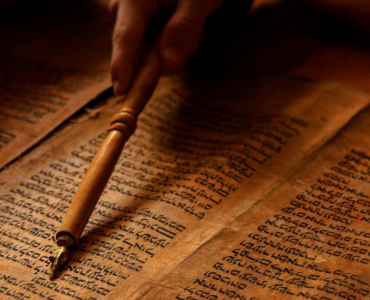FASTING KNOWN TO EVERYONE
*** Everyone knows about the worship of fasting. Regardless of religion, billions of people fast at certain times of the year. At the beginning of his duty, The Messenger of God Muhammad (pbuh) also practiced fasting by imitating the People of the Book. God did not need to describe the fast which everyone knows. That lasted until the verses that abrogated the previous practice were revealed. ***
Nutrition is the source of life. There is no living creature that can survive without nutrition, including microorganisms. Even inanimate objects continue their existence by feeding on something. The Earth feeds on the energy it receives from the Sun, and the Sun feeds on the fuel it has within itself. The only being who does not need nourishment is God. All beings other than Him must be fed to survive. The Almighty God also draws attention to the following contradiction about nourishment regarding the deification of other beings:
“Son of Mary, The Messiah was only a messenger. Such messengers had passed before him. His mother was a truthful woman. They both used to eat food. Look how we manifest the signs to them, then look, how they are misled to lies!” Maida 5/75.
All living things act with the instinct to eat as soon as they are born. Babies want to put everything they can into their mouths for the first year. In this period, the instinct of eating is above everything. There is no difference between human babies and baby animals during these periods. As a human being develops, he learns to rule over the eating instinct. Animals, on the other hand, continue in the former line. So as to that finding food and nourishment is like a purpose of existence for animals. It is also known that animals, unlike humans, cannot restrain their instinct to eat and therefore die from overeating. Especially herds released into the meadow can perish if they are not grazed by a competent shepherd. A human being begins to resemble animals to the extent that he becomes a slave to the eating instinct. The Almighty God says in this regard:
“God will admit those who believe and do righteous deeds into gardens in which rivers flow, whereas they who ignore the truth shall enjoy (the temporary benefits of this life) and eat as cattle eat – the fire (of the hereafter) is their abode” Muhammad 47/12.
The worship of fasting is to hold onto the basic instincts of living things, namely nutrition and sexual desires, at certain intervals, just because God has commanded it. In this way, we show that we are not captives of our instincts like animals, and we put forth our difference from them as human beings.
This worship is not only seen in Islam, it appears in all times and places, wherever people are. Although there are differences in details from era to era, basically the purpose is the same. The easiest and most valid application is the one in the Qur’an, as It supersedes[1] the divine Scriptures before It in either an equivalent or better way. So, let us examine what kind of supersession has occurred regarding fasting.
JEWISH FASTING
The Old Testament mentions a fast decreed to perform in the ninth month of the year:
In the fourth year of Jehoiakim the son of Josiah, king of Judah, this word came to Jeremiah from the LORD: “Take a scroll and write on it all the words that I have spoken to you against Israel and Judah and all the nations, from the day I spoke to you, from the days of Josiah until today. (…)
Then Jeremiah called Baruch the son of Neriah, and Baruch wrote on a scroll at the dictation of Jeremiah all the words of the LORD that he had spoken to him. And Jeremiah ordered Baruch, saying, “I am banned from going to the house of the LORD, so you are to go, and on a day of fasting in the hearing of all the people in the LORD’s house you shall read the words of the LORD from the scroll that you have written at my dictation. You shall read them also in the hearing of all the men of Judah who come out of their cities.(…)
In the fifth year of Jehoiakim the son of Josiah, king of Judah, in the ninth month, all the people in Jerusalem and all the people who came from the cities of Judah to Jerusalem proclaimed a fast before the LORD. (…)
Then the king sent Jehudi to get the scroll, and he took it from the chamber of Elishama the secretary. And Jehudi read it to the king and all the officials who stood beside the king. It was the ninth month, and the king was sitting in the winter house, and there was a fire burning in the fire pot before him. (Jeremiah 36:1-22).
According to the Hijri calendar of Islam, which is a lunar type of calendar, Ramadan is the ninth month. In this month, the Qur’an was revealed and fasting was declared:
” (The consecutive days are in) the month of Ramadan when the Quran, the Criterion which is a guide for humanity and which also includes the explanatory verses of that guide, was sent down. So, whoever among you witnesses that month must spend it fasting (…)” (Baqarah, 2:185).
Of course, it is not a coincidence that the Qur’an was revealed in the ninth month. The Night of Measures (Laylat al-Qadr), the night when commissioned angels descend to earth, is in this month. Since it is stated in both the Old Testament and the Qur’an that the angel of revelation comes at the head of the commissioned angels, it becomes clearer that the Book was revealed in the ninth month.
“We have indeed sent this (Message) down in the Night of Measures. But how would you know what is the Night of Measures? The Night of Measures is better than a thousand months. At that night, by the approval of their Master, angels descend with the duties granted to them about every matter” (Qadir, 97:1-4).
“By the clear Book! We have revealed it on a Blessed Night; We have been warning (with It). At that night, every decreed matter is distributed (among the angels in charge)” (Dukhan, 44:2-5).
In Judaism, Yom Kippur, which takes place at the end of the Ten Days of Repentance in the seventh month of Jewish Calendar, Tishri, is like an equivalent of the Night of Measures in terms of the value attributed to it. (In Islam, the Night of Measures falls within the ten-days of retreat period.) These days are also fasting days. The “fasting day” when God revealed the Book to Jeremiah must be Yom Kippur. Because Yom Kippur is known as the fasting day among Jews. This leads to the conclusion that Yom Kippur must have been in the ninth month. However, contrary to the information in the Old Testament, we cannot see that Jews today have a special fasting for the ninth month. In fact, Jewish Calendar is an issue by itself. There are different practices regarding even which month the year starts. While trying to calculate the months according to the lunar system, they were adjusted according to the solar calendar and fixed within the year. Due to this practice, which is contrary to nature, a year increases to 13 months in certain periods. Hence, it is inevitable that the dates of worship were distorted.[2]
There are different forms of fasting in Judaism. The most important fast is the great fast on Yom Kippur. This fast lasts about 25 hours, and it is prohibited to drink, shower, anoint, wear shoes, and have sexual intercourse. This fasting is obligatory for everyone, whether they are pubescent or not, they are obligated to fast.[3] Apart from this, various fasts are held throughout the year. Especially after the exilic period, fasting every Monday and Thursday has become a tradition in Judaism.[4] However, unlike the Yom Kippur usually fasted between sunrise and sunset, it is only prohibited to eat and drink during these fasts .
FASTING IN THE QUR’AN
The first verse about fasting in the Quran commands believers to fast as the previous communities did:
“Oh, you who believe! Fasting has been prescribed for you in the way it was prescribed for the ones before you, so that you may refrain from doing wrong” (al-Baqarah 2:183).
This verse does not contain any information on the description of fasting. Fasting is one of the examples that the Qur’an does not give details on cases that are known to everyone. The Qur’an provides detailed explanations about some subjects while It only points out the source where we can find the details about other subjects. The following verse is an example of this:
“The months of Pilgrimage are known. Whoever undertakes (the responsibility of) the Pilgrimage in those months is not allowed to speak of eroticism or to deviate from procedures of Pilgrimage or to quarrel (…)” (al-Baqarah 2:197).
Here, too, the Almighty God does not go into details by counting the names of the months one by one, but points out the source to find these details by using the phrase “known”. That means, “you will see many people who are already performing this”.
Muslims started fasting after the relevant verse of Chapter al-Baqarah was revealed. They learned the details about fasting such as, the times to start and stop fasting, the incidents that break the fast, from the practices of the People of the Book. Because the Qur’an itself guided them this way. If the application of the People of the Book were problematic, Almighty God would not only tacitly say “Do as those before you”, but send down enlightening details.
However, we understand from the verses that were revealed later on that Muslims had difficulty in keeping the fast ordered in verse 183 of Baqarah. Although we cannot find details from historical sources, we can deduce from the statements in verse 187 of Surah al-Baqarah that this fast was similar to the full-day big fast observed by Jews:
“It has been made lawful for you to be intimate with your wives on the nights of fasting. They are a garment for you, and you are a garment for them. God has known that you were betraying yourselves, and He has welcomed your turnaround and pardoned you. Now, then, you may have intercourse with them. Seek what God will prescribe for you. Eat and drink, until the white streak (of light) in the direction of dawn is clearly distinguishable from the black streak (of land in that direction) for you. Then, complete the fast until nightfall. Do not have intercourse with your wives while you continue to seclude yourselves in the places of prostration to God. These are the bounds set by God; do not approach them! Thus God explains His verses to humankind, so that they may refrain from doing wrong” (al-Baqarah, 2:187).
“Ali Ibn Abu Talha relates that Ibn Abbas said: After performing the Isha prayer in Ramadan, Muslims were forbidden to eat and have intercourse with their wives until the next evening. Then, some of the Muslims had a meal after Isha prayer in Ramadan and got together with their wives. Among them was the son of Hattab, Omar (r.a). This verse was revealed when they told the Messenger of God about the situation.”[5]
“Musa Ibn Uqba, through Qurayb, relates what Ibn Abbas said: Before the verse about fasting, which makes it lawful for Muslims to eat, drink and have intercourse with their wives, was revealed; if a person fell asleep, he would not be able to eat, drink, or have intercourse with his wife until the next evening.”[6]
We can understand from this information that Muslims abstained from eating, drinking, and having sexual intercourse during fasting nights before this verse was revealed. This practice is also in accordance with the rulings of the great fasting of Jews.
“Abu Jafar al-Razi says that Rabi’ Ibn Anas said he heard Abdullah Ibn Umar say from a person: When the verse “Fasting is prescribed for you as it was prescribed for those before you” was revealed, the fasting made obligatory for previous nations was as follows: When he performed the night prayer and went to bed, things like eating, drinking, women, etc. would be haram for him.”[7]
Thus, the fasting commanded in the 183rd verse of Surah Al-Baqarah was abrogated and facilitated by this verse. This is in accordance with God’s supersession system. Almighty God says:
“If We supersede a verse, or cause it to be forgotten, We bring either a better one or an equivalent one. Do you not know that God sets the measures over each and every thing?” (al-Baqarah, 2:106).
CONCLUSION
Fasting is a worship common to all religions. The difference in the months of fasting is caused by distortions in the calendars. The differences in the ways of practicing fasting are related to the rule of supersession between God’s Books. The “fasting of the previous nations” commanded in verse 183 of Baqarah was abrogated and facilitated by verse 187 of that Surah. Believers, therefore, should no longer fast as the previous nations did, but they must follow the fasting described in verse 187 of Surah al-Baqarah.
Authored by Vedat YILMAZ
Translated by Sıla KARACAN
[1] The word translated as “supersession” is “naskh”. Naskh, in its literal context, means the act of “bringing two things side by side, and transferring the text in one to the other”. Naskh is also “superseding something, to be substituted by another.” This is the case where a judgment in a verse is replaced by another simpler or better judgment in another verse. This first verse is called the mansukh, and the latter is the nasikh (Kitab al-’Ayn, al-Khalil ibn Ahmad al-Farahidi). Accordingly, the act of a person transferring a text he/she has written, to another place is naskh. Such person removes part of that text, modifies another, and copies the exact wording of the most of the text. The second version abrogates and supersedes the first one. The last Book of God is revealed so as to supersede the preceding ones. God did not transfer part of the judgments in previous books to His last Book, replaced part thereof with better orders, and literally transferred most of them as they are.
[2] The annual worships of fasting, sacrificing animals, and the Pilgrimage, as well as the haram months in which believers must cease war are all designated according to the lunar calendar in the Quran. This is the same in previous Scriptures too, but the scholars or monks of the People of the Book have later on fixed them to certain solar months which shifted the months to fast, cease war, and sacrifice from their original times. The almighty God calls this a transgression in ignoring the truth (The Quran 9:37).
[3]Adem Özen, “Yahudilikte İbadet”, p.177.
[4]Adem Özen, “Yahudilikte İbadet”, p.179.
[5]Ibn Kathir, “Hadislerle Kur’an-ı Kerim Tefsiri”, vol.3 p.729, Çağrı Yay., 1993.
[6]Ibn Kathir, “Hadislerle Kur’an-ı Kerim Tefsiri”, vol.3 p.729, Çağrı Yay., 1993.
[7]Ibn Kathir, “Hadislerle Kur’an-ı Kerim Tefsiri”, vol.3 p.704, Çağrı Yay., 1993.








Add comment